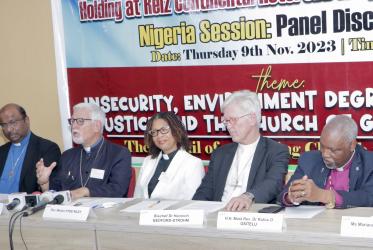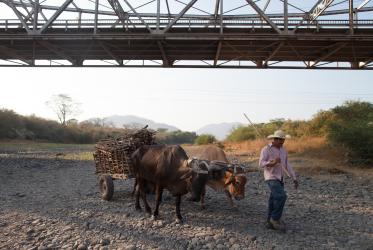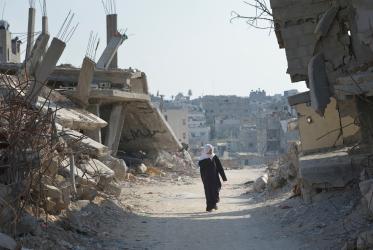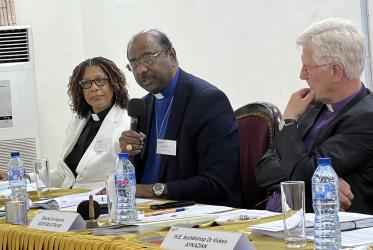There’s nothing worse than reflecting upon an obscure passage from scripture except reflecting upon a passage or story that’s so familiar that everyone has heard, preached and taught it a million times! I want to look at what is good in this story—the good ascribed to the Samaritan, obviously the least likely to do the good—instead of looking and speculating on the pathology of the story; why didn’t the most likely people—the priest and Levi—do good?
So you know the story. A lawyer or religious scholar stands up to test Jesus. The word test could just as well be that he wants to best Jesus, or trip him up. Like any good lawyer, he doesn’t ask a question that he doesn’t already know the answer to. He’s looking for confirmation of what he already believes, or what he’s already doing, or how he already lives. He wants to make himself look good!
Theologian/bible scholar, Justo Gonzalez, writes that the setting of the parable is a warning about misusing theology. The lawyer/scholar questions Jesus in order to justify himself. He asks the question, who is my neighbor, in order to avoid engaging/caring for/helping his neighbor.
Jesus does the great teaching trick of turning the question around on him: “what does it say in the law,” he asks. “What do you know? What do you read there?” The religious scholar is (in my mind) all puffed out with self-assurance and ready to show this Galilean bumpkin a thing or two. He begins to rattle off the familiar “You shall love the Lord your God with all your heart, mind, soul and strength…and your neighbor as yourself.”
I’m pretty sure Jesus smiled at him in a way that conveyed that he would have gotten an A. “Yes,” Jesus says. “Do all these things and you will live,” or “have eternal life.” But then our puffed up friend pushes his luck. He asks a question he doesn’t really know how Jesus will answer: “Who is my neighbor?”
But he should have known: in Judaism, everyone was to be treated as a neighbor, not just fellow Jews or those you like but in fact any other human being. And Mr. PuffedUp knows that! In Lev 19:33-34, the neighbor is one who dwells nearby but is also a stranger. But the neighbor can also be an enemy. The same consonants for the word, neighbor (one who dwells nearby or fellow citizen), exist in the word enemy in Hebrew; same consonants but different vowels in between them. They are, in other words, closely related. Our neighbor is someone near and dear as well as someone feared and even hated. You can’t get away from your neighbor! You are to love not only your friends/family but also your enemies; I believe Jesus has some teaching on that!
So if we look at what is right and good in the story, to love your neighbor is to care for anyone in need as is the case for what the Good Samaritan does. But how do we love our neighbor? The secret is in the verbs! The Samaritan is the one who sees the man in the ditch; our neighbor is not invisible to the Samaritan or us. He crosses the road to get to him; he goes out of his way overcoming whatever it was (fear? Disgust?) that prevented the others from crossing the road. And he is moved with pity; he has a heart, perhaps he can imagine himself in the same predicament.
MLK once preached a sermon on this passage and he said, “It’s possible that the priest and Levite were afraid…and so the first question that they asked was, “If I stop to help this man, what will happen to me?”…When the Samaritan came by, he asked himself a different question: ‘If I don’t stop to help this man, what will happen to him?” King went on to ask, ‘If I don’t stop to help the sanitation workers, what will happen to them?” King then went to Memphis to help the sanitation workers and it was there that he was assassinated. He acted: he saw the need, crossed states to get to those in need, and put himself in danger.
The Samaritan’s actions continue to reveal his love for his neighbor with more action verbs: he goes to him, bandages him up, pours oil and wine on his wounds, puts him on his own animal, takes him to an inn, and cares for him. All action verbs: he doesn't do any studies or surveys, he doesn't even assess his own resources or evaluate a multitude of possible responses, and no task forces are formed; he doesn’t continue to ask questions about how this man got there...he simply sees and responds with helpful, hopeful action. He leaves the man at the inn, gives the innkeeper his credit card (or the 1st century equivalent) and comes back later to check on him. The Samaritan’s love for neighbor wasn’t all talk and promises, but love in action.
After Jesus tells the story of the Good Samaritan, he reframes the question, "Which of these three do you think was a neighbor to the man who fell into the hands of the robbers?" The self-justifying question, "Who is my neighbor?" is reframed to ask, "Who proved to be neighbor? The proof of being a neighbor is in the doing, not just proximity nor a warm-fuzzy relationship with another nor good intentions and motivations. Not, it’s in concrete actions that realize hope through help.
But “Who is our neighbor?” Isn’t just a question about love. It’s also a question of justice. As the late Rabbi Jonathan Sacks said, “love is not enough. You cannot build a family, let alone a society, on love alone. For that you need justice also. Love is partial, justice is impartial. Love is particular, justice is universal. Love is for this person not that, but justice is for all. Much of the moral life is generated by this tension between love and justice.
Who is our neighbor and how are we called to act in love and justice? I wrote a book on Jesus and the environment now about 10 years ago with my niece who taught environmental science at the time, and in the course of writing it, my definition of neighbor was expanded. When it comes to climate justice, I came to realize, our neighbor is definitely near—others who experience the same drought, intense storms, fires, toxic disasters, and other environmental disasters as we do—and our neighbor is far—on the other side of the country or continent or world.
At the Assembly in Busan one day in the ecumenical conversation group that I was moderating, we heard from Rev. Tafue Lusama who is/was the General Secretary of the Congregational Christian Church of Tuvalu, a series of eight islands in the South Pacific. He is also an activist for the Climate Action Network and often speaks at United Nations conferences on what is happening to his homeland.
Since he was young, he has observed and it has been documented that the islands are slowly being submerged into the sea. The water table is filled with salt and is killing the vegetation and other plants that support life on the islands. Within 30-50 years, they will be gone or at least uninhabitable. Children grow up wondering where they will live. His story was a call to climate justice out of love for our neighbor.
Another day we heard from Bishop Sofie Petersen who is an Inuit and the second female bishop in the Danish Lutheran Church, serving Greenland. She told about how Greenland observes the melting of glaciers and icebergs around them. The warming causes the permafrost to melt and that compromises the structures of their houses as they sink or sag with the thawing ground. Again, a call to climate justice out of love for our neighbor.
From opposite ends of the globe, they are neighbors who are vitally connected to each other. And we are neighbors with them both. Their stories like many stories are a call to climate justice out of love for our neighbor.
But then as I was working on this book with my niece, I realized that a neighbor is both now and in the future; my neighbor hasn’t even been born yet. Our neighbors are our grandchildren and their children. Our neighbors are those who come after us and rely on us to work for climate justice out of love for them.
As COP26 ended yesterday, there is the risk of more talk than action to avoid the melting permafrost and the rising sea waters. As countries return home, especially mine, putting promises into action will make all the difference in the world—literally life or death—for those who live at the poles and all of us in between. What action verbs are we implementing to care for our neighbors in the future? The Good Samaritan made sacrifices of his own means and convenience. What will we, especially those of us who contribute the most to carbon emissions sacrifice out of our own means and convenience? What are our action verbs that insure climate justice for our neighbors—near and far, now and in the future?
I still teach on environmental justice from the perspective of science and the scriptures from time to time. I still get asked what climate justice has to do with our faith! Our faith calls us in the Hebrew scriptures and in the New Testament to love of neighbor.
The Somali poet, Warsan Shire, wrote this poem:
Later that night,
I held an atlas on my lap
Ran my fingers across the whole world
and whispered
where does it hurt?
it answered
everywhere
everywhere
everywhere
Everywhere creation is groaning from our lack of action; lack of love and justice; everywhere our neighbors are hurting from climate change; everywhere there is the need to engage in love and justice for our neighbors near and far, now and in the future…yes, everywhere, for everyone.





